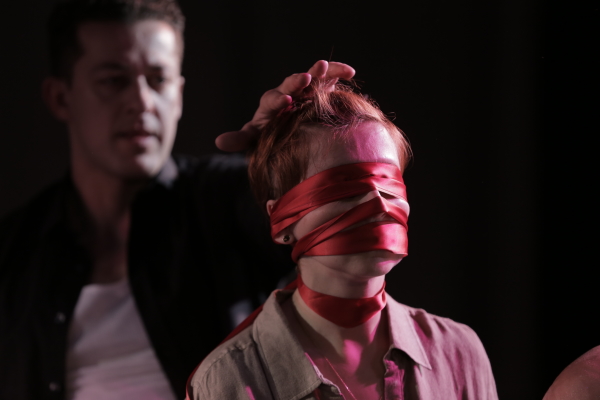Knock: A Journey to a Strange Country

(© George Itzhak)
Daniil Kharms, a Russian writer who penned hundreds of surrealist poems and stories before he died in a mental hospital in 1942, has entered New York's theater consciousness of late with The Old Woman, which starred Mikhail Baryshnikov and Willem Dafoe at BAM. A not-quite-as-stylized production of Kharms' writings has now taken the stage of the Players Theatre in a production by Lost & Found Project, a division of the National Yiddish Theatre FolksbieneRU, in association with Genesis Philanthropy Group.
Knock: A Journey to a Strange Country comprises several surrealistic stories loosely linked by the theme of exploration, from life's mundane events to scenes of horror to cosmic musings. As might be expected from a piece inspired by Kharms' work, Knock disorients and at times frustrates, but anyone willing to let these bizarre tales course through the brain without impediment might experience some personal illumination by the end.
Knock relies not on plot to tell its story (if it can be called a story), but rather on a series of vignettes that merge and overlap with one another in a dreamlike fashion. Nine performers (four men and five women) begin Knock's journey in an inspection line overseen by a lollipop-sucking officer. The man at the front of the line then begins to tell a story about himself by pulling one person after another out of the line; then the scene shifts to another man reading a book who is suddenly seduced by a woman twirling a Hula–Hoop around her waist; the hula-hooping woman then becomes trapped in a cosmos of "spheres," represented by white balloons that are carried onstage by the other actors. The white-balloon scene bleeds into another where a man goes on a shooting rampage, killing everyone in sight, red ribbons flying into the air to represent spewing blood. And later, yet another man appears, speaking Hebrew and casting out demons from a group of congregants. The irrational, nonlinear storytelling continues in this way for about 90 intermission-less minutes.
If nothing else, director Alexandre Marine (who, with Boris Zilberman, adapted Kharms' stories for Knock) creates a bizarre, often incoherent dreamscape, heightened by Dmitri Marine's lively score. One character inexplicably transforms into another, yet shards of insights occasionally break through. What does one make of the statement uttered by a man who can rearrange the atoms of his body so that he can pass through objects and people? "To hell with this meaning of life," he says. "I'll just keep walking through walls, and that's it." Searching for meaning, Kharms seems to say, results in dead ends, even for a man who can walk right through them.
Knock's company of fine actors brings a seriocomic atmosphere to these stories. Sergey Nagorny, in multiple roles, gives a funny performance as the befuddled reader in the Hula-Hoop scene yet moments later morphs into a frightening mass murderer. Darya Ekamasova knows how to exude the seduction of a femme fatale, and Ruslan Verknovsky manages to combine nonchalance with ferocity in several scenes.
Experimental pieces like Knock sometimes feel like they have jumped the shark. Avant-garde works in this style now seem not avant but quaint, even as they befuddle and infuriate. Yet for theatergoers who are into experiencing something unusual and who don't mind letting Kharm and Marine's journey take them where it will, Knock might prove to be a theatrical door worth opening.











